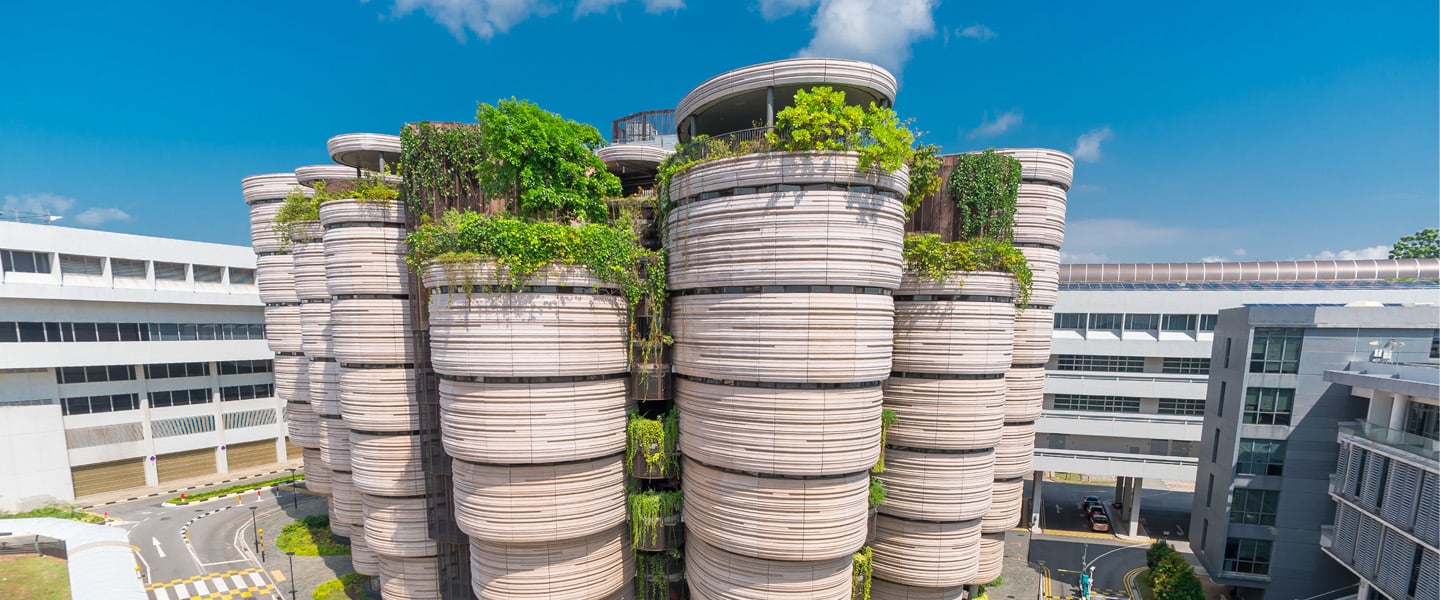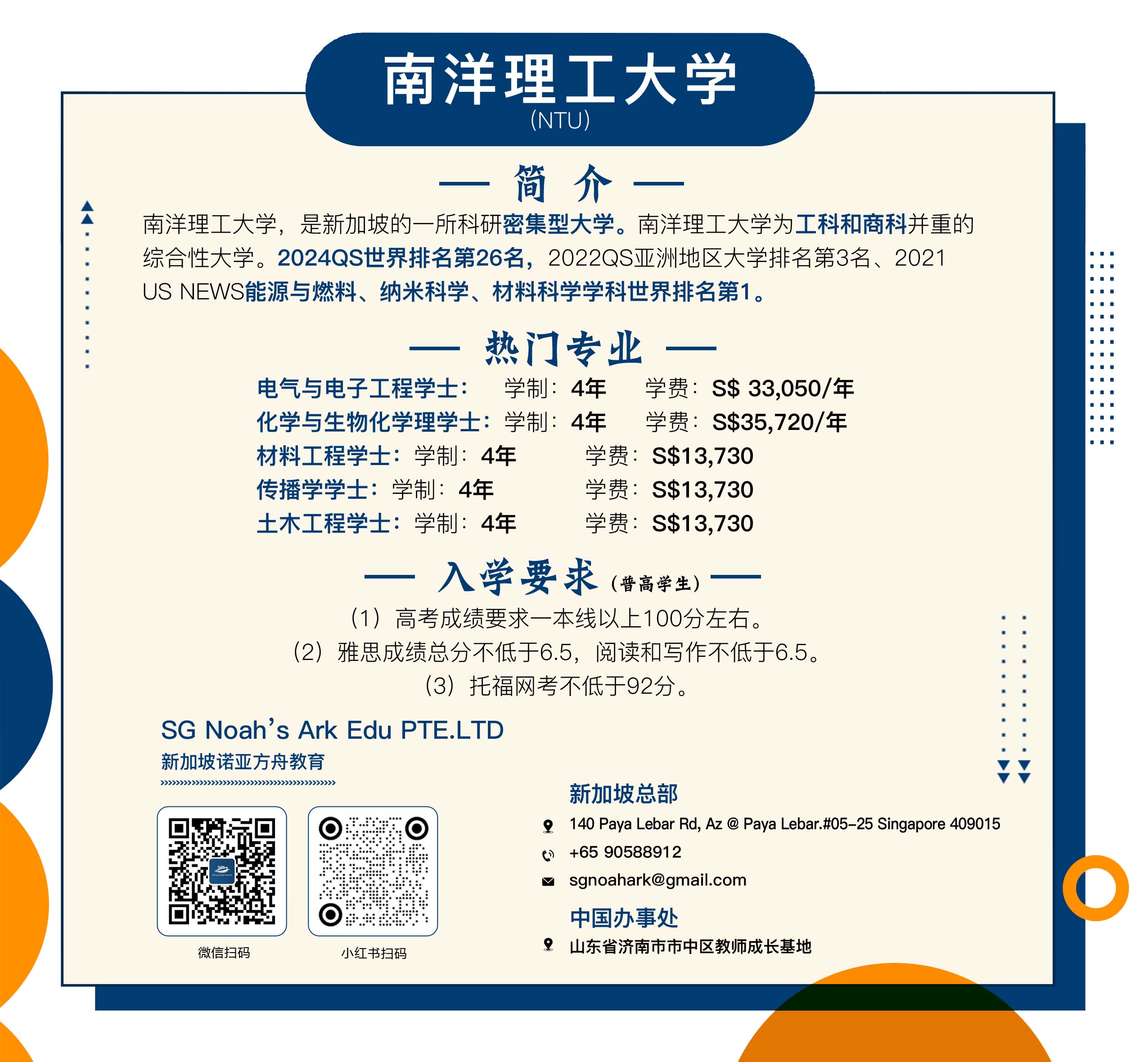Nanyang Technological University


Nanyang Technological University, abbreviated as NTU, is a research intensive university in Singapore and one of the two largest public universities in Singapore. Its predecessor was Nanyang Institute of Technology established in 1955, which was officially renamed Nanyang University of Technology in 1991. In 2024, QS ranked 26th in the world, second in Singapore, and fourth in Asia.
The NTU campus environment is clean, with excellent greenery, large areas of tropical vegetation, and towering trees. The campus is open without walls or gates. NTU main campus is often listed among the top ten most beautiful university campuses in the world. The most famous building on the campus is the teaching center of Nanyang Technological University. Because the building looks like a steamer, it is called "Xiaolongbao".
The NTU interdisciplinary curriculum design adopts both experiential and collaborative learning methods to enhance students' abilities in innovation, cooperation, moral emotions, and other aspects, allowing students with different characteristics to have their own gains, gain interest and motivation in learning, reduce learning pressure, and also improve their comprehensive abilities, cultivating versatile talents.
Nanyang University of Technology mainly teaches in English and also offers many Chinese language courses to facilitate the learning of international students from China.
The tuition fee for Nanyang Technological University is about 150000 RMB per year, and the annual living expenses are about 50-60000 RMB, which is still very cost-effective compared to universities in the UK and the US. The school provides financial aid and scholarship programs that cover tuition and living expenses, reducing the financial pressure on students.
Nanyang Technological University has established cooperative relationships with major companies, including Alibaba, HP, Volvo, Delta Electronics, Singapore Telecom, etc. Its employment value has exploded in fields such as artificial intelligence, financial technology, data science, robotics, intelligent transportation, computing, healthcare, and clean energy.
According to the employment report for graduates from Singapore's universities, the average monthly income of graduates from Nanyang Technological University is SGD 4000, ranking first among major universities in Singapore. Among them, graduates majoring in business and computer science have the highest starting salary, with a median monthly salary of 6300 Singapore dollars. After graduation, students who stay for new employment can apply to become a Singapore Green Card, which is highly competitive for employment in their home country. At the same time, they can also enjoy various policy benefits.
1. Advantages Major of Nanyang University of Technology
Nanyang Technological University is divided into four colleges: Arts, Science, Engineering, and Business, as well as the Graduate School and Li Guangqian Medical College. In addition, NTU has established two independent colleges, namely the National Institute of Education and the Rajaratnam International Research Institute; The School of Engineering, the School of Literature, and the School of Science also have secondary colleges.
College of Engineering (COE)
College of Humanities, Arts, and Social Sciences (College of Humanities, Arts, and Social Sciences)
College of Science (COS)
Nanyang Business School (NBS)
Graduate College (GC)
Lee Kong Qian School of Medicine (LKC Medicine)
National Institute of Education (NIE)
S. Rajaratnam School of International Studies (RSIS)
According to the QS World University Discipline Rankings, many majors at NTU rank in the top 50:
Communication and Media Research (6); Materials Science (6); Engineering - Civil and Structural (9); Engineering - Electrical and Electronics (9); Engineering Chemistry (10); Chemistry (11); Education and Training (11); Computer Science and Information Systems (11); Engineering Machinery (11); Data Science (12); Engineering and Technology (14); Environmental Science (15); Marketing (16); Library and Information Management (19); Accounting and Finance (21); Business and Management Research (21); Physics and Astronomy (22); Hotel and Leisure Management (26); Mathematics (29); Psychology (32); Linguistics (35); Politics (35); Social Sciences and Management (35); Architecture and Built Environment (36); Sports related subjects (36); Statistics and Operations Research (38); Art and Design (39); Biological Science (44); Natural Science (46); Economics and Econometrics (49).
2. Application requirements for Nanyang University of Technology
Undergraduate application requirements:
Approach 1: A-Level application
① Academic performance:
Achieve excellent exam results in at least 4 advanced courses in the same batch of exams;
International applicants who have achieved excellent results in three advanced courses in the same batch of exams can only apply for "no allowance" tuition type courses;
Nanyang University of Technology does not offer conditional admissions based on predicted grades.
Applicants need to meet the minimum examination subject requirements for the relevant major.
Approach 2: IB application
At the end of the course, achieve excellent passing grades (7 points/6 points) in at least 3 Advanced Level Courses (HL) and 3 Standard Level Courses (SL), including Theory of Knowledge (TOK) and Extended Essay (EE), and meet the minimum exam subject requirements.
Approach 3: Application for College Entrance Examination Scores
Participated in the college entrance examination:
The college entrance examination score reaches the admission line for the first tier universities of that year and exceeds 80-100 points, with the final reference to the admission score line of Tsinghua and Peking University
Not taking the college entrance examination:
Excellent grades in the first and second year of high school (fresh)
Language score requirement: IELTS 6.0+; TOEFL 90+
Master's application requirements:
1. Bachelor's degrees in relevant majors from key universities, with an average score of 80+
2. IELTS 6.0+; TOEFL 900+
3. GRE or GMAT scores are required
4. Having research papers, related internships or work experience will earn extra points
